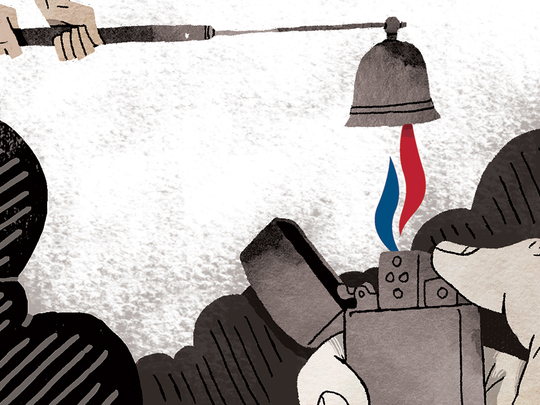
The relative strength of nationalism and internationalism were tested in France over the weekend. And this time the internationalists came out ahead. In Paris, Laurent Fabius, the foreign minister, was able to bring down his flashy green gavel and announce that almost 200 nations had agreed a climate change deal.
The following day, the National Front, a nationalist anti-immigration party, failed to win control of any of France’s regions in elections.
Marine Le Pen, the leader of the FN, had said that politics is increasingly a contest between nationalists and globalists. This weekend’s events show that the globalists are still just about in control. But the margins of victory and defeat are narrowing. In 2002, Jean-Marie Le Pen took 17 per cent as the FN candidate in the second round of a French presidential election. This time, his daughter and granddaughter (far-right politics is a family affair in France) scored well over 40 per cent in regional contests. On a national level, the FN is now scoring less than 30 per cent.
The climate accord was an important success for the globalists who are decried by the National Front. At a time when Le Pen is painting a picture of a France that has ceased to matter in the world, calling for the closure of borders and the withdrawal from international agreements, this was a demonstration of a confident, internationally minded nation that is fully capable of playing a global role. The fact that the conference took place in Paris weeks after the terror attacks was also an important symbol of French resilience.
While the climate deal certainly represents a remarkable piece of international co-operation, it will face many hurdles before it comes into force. As its many critics point out, the provisions of the Paris accord may well prove inadequate to the task of slowing climate change, even if they are observed.
These weaknesses in the agreement matter because the contest between nationalists and internationalists is playing out all over the world. Climate change is a particularly vexing issue for nationalists since it clearly can only be tackled by global action. That is one reason why many nationalists choose to pretend that global warming is simply not happening.
In the US, Republican nationalists such as Donald Trump and Ted Cruz will queue up to denounce the climate agreement. Trump will attack the fact that richer nations will pay developing countries to cut emissions and will probably cackle that he could use his dealmaking skills to make the Chinese and Indians pay. (Just like the Mexicans will pay for a wall along the border.)
Barack Obama’s swift insistence that the climate deal represented a triumph for US leadership was an attempt to pre-empt these criticisms. It is true that an earlier US-Chinese agreement laid the groundwork for the Paris deal. Nonetheless, the US president’s words will have sounded gratingly self-centred to non-American ears. But Obama’s statement has to be understood in the US context, where the president is routinely accused, even by his own side, of weakness on the international stage.
The “weak Obama” argument sounds particularly persuasive if you measure leadership by numbers of bombs dropped. In reality, the climate change accord brings to an end a year of landmark breakthroughs in international diplomacy by the Obama administration. As well as the climate agreement, this year has brought a diplomatic pact on Iran’s nuclear programme, a major trade accord in the form of the Trans-Pacific Partnership and the reopening of US diplomatic relations with Cuba. All four of these achievements have been many years in the making.
The immense patience, the spirit of compromise, the attention to detail and tolerance for boredom involved in making these deals represents a stark contrast with the taste for violent or simplistic solutions visible on the American right, where Trump’s promise to exclude all Muslims from the US has been matched by Cruz’s pledge to drop so many bombs on the Middle East that he will make the desert glow.
It was not just the Americans and the French who needed to face down their nationalists. The governments of India and China are vulnerable to charges that they are accepting western-imposed limits to their own nations’ economic growth. But at a time when Beijing is covered in choking smog and as the glaciers on which India depends recede, the Chinese and the Indians have recognised that a shared international interest in tackling climate change must trump any desire to insist that this is a problem the west created - and must tackle alone
The climate deal and the defeat of the National Front signified a good week for the globalists. But the victory of internationalists over nationalists cannot be assumed. On the contrary, nationalist forces are still gaining strength in Europe, Russia, the US and east Asia. The forces that feed the nationalist narrative — economic stagnation, terrorism and the fear of immigration — are not going away.
Ultimately, however, nationalism cannot offer convincing answers to the real issues that politicians such as Le Pen and Trump raise. As the climate change accord recognised, for all the frustrations the nations of the world are compelled to work together in the common good.
— Financial Times








